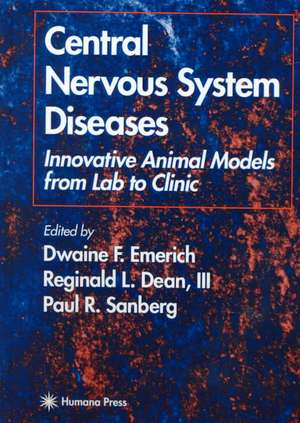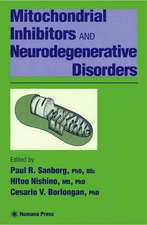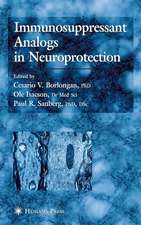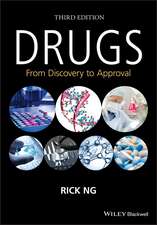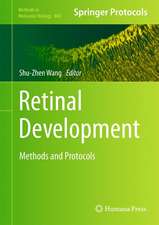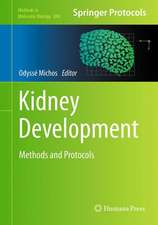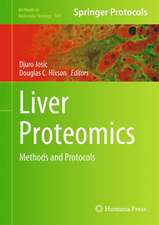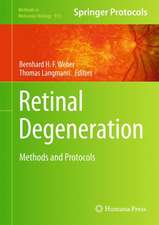Central Nervous System Diseases: Innovative Animal Models from Lab to Clinic: Contemporary Neuroscience
Editat de Dwaine F. Emerich, Reginald L. Dean III, Paul R. Sanbergen Limba Engleză Hardback – 24 noi 1999
| Toate formatele și edițiile | Preț | Express |
|---|---|---|
| Paperback (1) | 1234.00 lei 6-8 săpt. | |
| Humana Press Inc. – 19 noi 2010 | 1234.00 lei 6-8 săpt. | |
| Hardback (1) | 1248.02 lei 6-8 săpt. | |
| Humana Press Inc. – 24 noi 1999 | 1248.02 lei 6-8 săpt. |
Din seria Contemporary Neuroscience
- 5%
 Preț: 1128.63 lei
Preț: 1128.63 lei - 18%
 Preț: 965.52 lei
Preț: 965.52 lei - 5%
 Preț: 1108.35 lei
Preț: 1108.35 lei - 18%
 Preț: 1228.15 lei
Preț: 1228.15 lei - 18%
 Preț: 1229.73 lei
Preț: 1229.73 lei - 18%
 Preț: 1231.64 lei
Preț: 1231.64 lei - 18%
 Preț: 945.47 lei
Preț: 945.47 lei - 18%
 Preț: 1244.08 lei
Preț: 1244.08 lei - 15%
 Preț: 638.76 lei
Preț: 638.76 lei - 18%
 Preț: 1240.47 lei
Preț: 1240.47 lei - 18%
 Preț: 1385.99 lei
Preț: 1385.99 lei - 18%
 Preț: 1227.84 lei
Preț: 1227.84 lei - 18%
 Preț: 1220.88 lei
Preț: 1220.88 lei - 18%
 Preț: 961.55 lei
Preț: 961.55 lei - 15%
 Preț: 695.70 lei
Preț: 695.70 lei - 18%
 Preț: 959.82 lei
Preț: 959.82 lei - 5%
 Preț: 1112.17 lei
Preț: 1112.17 lei - 18%
 Preț: 1233.83 lei
Preț: 1233.83 lei - 18%
 Preț: 950.96 lei
Preț: 950.96 lei - 24%
 Preț: 799.51 lei
Preț: 799.51 lei - 18%
 Preț: 954.77 lei
Preț: 954.77 lei - 18%
 Preț: 1227.21 lei
Preț: 1227.21 lei - 5%
 Preț: 1117.46 lei
Preț: 1117.46 lei - 18%
 Preț: 949.10 lei
Preț: 949.10 lei - 5%
 Preț: 1114.35 lei
Preț: 1114.35 lei - 15%
 Preț: 694.22 lei
Preț: 694.22 lei - 18%
 Preț: 950.52 lei
Preț: 950.52 lei - 5%
 Preț: 1124.07 lei
Preț: 1124.07 lei - 5%
 Preț: 1117.10 lei
Preț: 1117.10 lei - 24%
 Preț: 1089.45 lei
Preț: 1089.45 lei - 18%
 Preț: 1227.52 lei
Preț: 1227.52 lei - 18%
 Preț: 955.08 lei
Preț: 955.08 lei - 5%
 Preț: 1417.38 lei
Preț: 1417.38 lei
Preț: 1248.02 lei
Preț vechi: 1521.98 lei
-18% Nou
Puncte Express: 1872
Preț estimativ în valută:
238.84€ • 259.34$ • 200.62£
238.84€ • 259.34$ • 200.62£
Carte tipărită la comandă
Livrare economică 22 aprilie-06 mai
Preluare comenzi: 021 569.72.76
Specificații
ISBN-13: 9780896037243
ISBN-10: 089603724X
Pagini: 512
Ilustrații: XVI, 512 p.
Dimensiuni: 170 x 254 x 31 mm
Greutate: 1.32 kg
Ediția:2000
Editura: Humana Press Inc.
Colecția Humana
Seria Contemporary Neuroscience
Locul publicării:Totowa, NJ, United States
ISBN-10: 089603724X
Pagini: 512
Ilustrații: XVI, 512 p.
Dimensiuni: 170 x 254 x 31 mm
Greutate: 1.32 kg
Ediția:2000
Editura: Humana Press Inc.
Colecția Humana
Seria Contemporary Neuroscience
Locul publicării:Totowa, NJ, United States
Public țintă
Professional/practitionerCuprins
1 • The Cholinergic Hypothesis a Generation Later: Perspectives Gained on the Use and Integration of Animal Models.- 2 • Patterns of Cognitive Decline in the Aged Rhesus Monkey.- 3 • Cholinergic Lesions as a Model of Alzheimer’s Disease: Effects of Nerve Growth Factor.- 4 • The Immunolesioned Animal as a Model of Transmitter Dysfunction.- 5 • An Intracerebral Tumor Necrosis Factor-? Infusion Model for Inflammation in Alzheimer’s Disease.- 6 • The Senescence-Accelerated Mouse as a Possible Animal Model of Senile Dementia.- 7 • Transgenic Mice Overexpressing Presenilin cDNAs: Phenotype and Utility in the Modeling of Alzheimer’s Disease.- 8 • Intervention Strategies for Degeneration of Dopamine Neurons in Parkinsonism: Optimizing Behavioral Assessment of Outcome.- 9 • Development of Behavioral Outcome Measures for Preclinical Parkinson’s Research.- 10 • Behavioral Assessment in the Unilateral Dopamine-Depleted Marmoset.- 11 • Molecules for Neuroprotection and Regeneration in Animal Models of Parkinson’s Disease.- 12 • Antisense Knockdown of Dopamine Receptors.- 13 • Is Trophic Factor Gene Disruption a “Knockout” Model for Parkinson’s Disease?.- 14 • Operant Analysis of Striatal Dysfunction.- 15 • Intrastriatal Injections of Quinolinic Acid as a Model for Developing Neuroprotective Strategies in Huntington’s Disease.- 16 • Systemic Administration of 3-Nitropropionic Acid: A New Model of Huntington’s Disease in Rat.- 17 • Replicating Huntington Disease’s Phenotype in Nonhuman Primates.- 18 • Transgenic Mouse Models of Huntington’s Disease.- 19 • Rigid Indentation Models of Traumatic Brain Injury in the Rat.- 20 • Rodent Ischemia Models of Embolism and Ligation of the Middle Cerebral Artery: Clinical Relevanceto Treatment Strategies of Stroke.- 21 • A Primate Model of Hypertensive Cerebrovascular Disease.- 22 • Nictotinic Therapeutics for Tourette Syndrome and Other Neuropsychiatric Disorders: From Laboratory to Clinic.- 23 • Neural Grafting for Parkinson’s and Huntington’s Disease.- 24 • Future Prospects of Gene Therapy for Treating CNS Diseases.
Recenzii
"This book is an elegant survey of primate and nonprimate models for the most important of the CNS diseases, examining the prospects of treatment from various (slightly) promising drug therapies to the newest forms of fetal-tissue grafting. But more than that, the editors have compiled a paradigmatic study on the critical need for animal experimentation for the elucidation and treatment of human disease. Each chapter points out how animal models provided the only nonsuperficial insight available on various CNS syndromes, and perhaps equally important, how animals served as models for verification of theories and as test subjects for potential treatments. "- Modern Drug Discovery
"...the contributions contained in this monograph represent a serious attempt by many of the most important researchers in neuroscience to critically assess the most useful animal models in development today... this is an excellent volume which will be an essential reading for all experimental neuropharmacologists and a constant source of reference to both clinical and basic psychopharmacologists. The editors are to be congratulated for gathering together such an authoritative group of authors who have explained their research interests in an easily accessible way." - Human Phychopharmacology
"...the contributions contained in this monograph represent a serious attempt by many of the most important researchers in neuroscience to critically assess the most useful animal models in development today... this is an excellent volume which will be an essential reading for all experimental neuropharmacologists and a constant source of reference to both clinical and basic psychopharmacologists. The editors are to be congratulated for gathering together such an authoritative group of authors who have explained their research interests in an easily accessible way." - Human Phychopharmacology
Textul de pe ultima copertă
In Central Nervous System Diseases: Innovative Animal Models from Lab to Clinic, prominent experimentalists critically review the animal models widely used in developing powerful new therapies for central nervous system diseases, as well as their advantages and limitations. Coverage includes novel uses of animal models of Alzheimer's, Parkinson's, and Huntington's diseases, and studies of aging. Techniques that rely heavily on behavioral analyses, as well as models developed from infusions of neurotoxins and from advances in molecular biology are thoroughly explicated, as are models developed for more acute neurological conditions, including traumatic brain injury and stroke.
Comprehensive and authoritative, Central Nervous System Diseases: Innovative Animal Models from Lab to Clinic offers neuroscientists, pharmacologists, and interested clinicians a unique survey of the most productive animal models of the leading neurological diseases currently employed to develop today's innovative drug therapies.
Comprehensive and authoritative, Central Nervous System Diseases: Innovative Animal Models from Lab to Clinic offers neuroscientists, pharmacologists, and interested clinicians a unique survey of the most productive animal models of the leading neurological diseases currently employed to develop today's innovative drug therapies.
